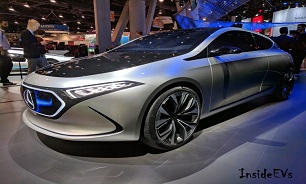Mercedes Exec: World Will Drive Hydrogen Not Battery Electric By 2040
Several automakers in India, including Mercedes-Benz, are pushing back against the country’s plan to force the auto industry to all-electric by 2030.

Khodrocar - Siam already made hints that it may not intend to make the switch to electrification, and surely not all-electric. Maruti Suzuki is in the process of surveying the market to decide if electric vehicles are viable. However, the most significant and strong-willed opposition came from the lips a Mercedes exec.
Reports assert that Mercedes has requested the government "not to rush with the all-electric vehicles push” and allow time for a global energy shift to hydrogen. The automaker believes that mandated electric cars could "foreclose better technological options.” Mercedes-Benz India managing director and CEO Roland Folger said:
"By 2040, the whole world will be driving home hydrogen cars. To me, the whole plan to go electric nationwide looks like a rushed with idea.”
Mercedes has publicized that a nationwide electrification of the automotive industry in India is not viable. The belief is that it doesn’t have the guaranteed potential for commercial success and the technology is far from where it needs to be to overtake ICE cars. Not to mention significant concerns regarding the lack of infrastructure.
Industry experts were shocked when India initially announced plans for the mandate. It turns out that many also cited other technologies like hydrogen as having greater potential. Mandating only all-electric vehicles could put an unnecessary damper on automakers that are exploring the possibility of other technologies. Folger continued:
"Ideally, regulators and policymakers should be totally aligned with what’s happening on the technology front because 5-10 years is a short period in the auto landscape. The least policymakers can do is to take the auto industry into confidence.
… what will happen to the investments already made in other technologies? Our planners should know that over the next two decades or so the whole world will be driving hydrogen cars and not electric cars.
Can the government invest hundreds of billions of dollars into setting up charging stations and associated infrastructure? If not, then who will foot the bill? Definitely not the private sector. If at all government manages to raise funds, is it worth the effort in terms of meeting the key objective of bringing down pollution?”
Folger also went so far as to say that the move to electric vehicles would create problematic power demands, which would lead to the need for more power plants and increased pollution. He explained:
"Yes, with the current coal-based power generation model, this would be more polluting as demand for electricity will jump manifold. Or do we have the finances to upgrade all our old thermal plants? Or can we go completely off polluting coal plants? If yes, what is the cost that such a plan will entail?”
Interestingly, however, the exec suggested that plug-in hybrids may be a viable option. He pointed out that this will create less need for charging infrastructure, and the cars are ultimately less expensive than pure EVs. Nonetheless, in his opinion, it will only be a temporary fix on the way to a hydrogen-powered planet.
Source: Inside EVs
Latest News


